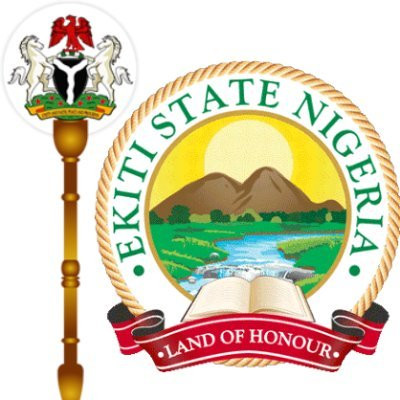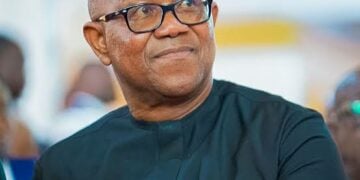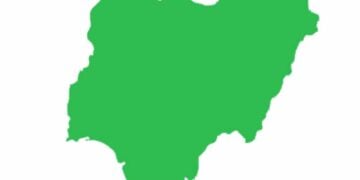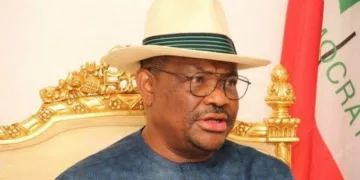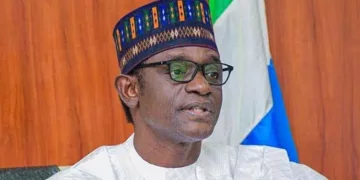Ekiti State is one of the states of the federation where staggered or what is also referred to as off-season governorship election is being held in the country.
This followed a judgment delivered by the former President of the Appeal Court, Justice Ayo Isa Salami, which sacked Chief Segun Oni of the then Peoples Democratic Party (PDP) from office in October, 2010.
Oni, who assumed office on May 29, 2007 gave way for Dr Kayode Fayemi of the then Action Congress (AC) who instituted the case against the election of the PDP candidate.
People of the state will, again, go to the polls on Saturday June 18, 2022 to elect the next governor of the state as Fayemi’s administration winds down on October 16, marking the end of his second tenure as governor of the state.
Fayemi, as All Progressives Congress (APC) candidate in the July 14, 2018 governorship election, defeated his closest rival, Dr Kolapo Olusola Eleka of the PDP.
In this dispensation, no fewer than 16 political parties, duly registered and cleared by the Independent National Electoral Commission (INEC), have presented candidates for the June 18 election.
The candidates and the political parties that will slug it out in the electoral contest to succeed Fayemi and the APC include: Ajagungbala Moses Olajide – (AAC); Oluwole Olumayokun Oluyede – (ADC); Elebute-Halle Josephine Kemi – (ADP); Abiodun Abayomi Oyebanji – (APC).
Others are, Fagbemi Peter Adegbenro – (APM); Christianah Modupe Olatawura – (APP); Fatomilola Oladosu Abiodun – (NNPP); Agboola Olaniyi Ben – (PRP); Adeolu Kolade Akinyemi – (ZLP); Adebowale Oluranti Ajayi – (YPP); Olusegun Adebayo Oni – (SDP).
The rest are, Olabisi Kolawole – (PDP); Reuben Boye Famuyibo – (Accord); Benjamin Olufemi Obidoyin – (APGA); Daramola Rowlànd Olugbenga – (LP); and Iyaniwura Tope Ifedayo – (NRM).
There were claims that one Prince Adeyinka Alli has replaced Mrs Olatawura as APP candidate for the election through a court injunction, but the INEC national commissioner, Festus Okoye at an event recently in Ado Ekiti, dismissed the claim, saying such was not known to the electoral body.
As the election beckons, there are quite a number of factors that will make the exercise interesting that need to be highlighted.
The Past, Present and Recurring Agitations
Ekiti State consists of three Senatorial Districts, namely Ekiti North, Ekiti Central and Ekiti South Districts.
Under Ekiti North, there are five local government areas namely: Ido/Osi, ikole, Ilejemeje, Mona and Oye.
Also, Ekiti Central is made up of five local government areas, which include: Ado, Efon, Ekiti, Ijero and Irepodun/Ifelodun.
Ekiti South has the largest number of local government areas namely, Ekiti East, Ekiti South West, Emure, Gbonyin, Ikere and Ise/Orun.
Past governors of the state are: Otunba Adeniyi Adebayo who was in the saddle between May, 1999- May, 2003; Ayodele Fayose occupied the position between May, 2003-October, 2006; Chief Segun Oni ruled the state between May 2007- October 2010, Dr Kayode Fayemi held sway between October, 2010-October, 2014.
Fayose returned as governor of the state in October, 2014 and completed his second tenure in October, 2018. He was succeeded by Fayemi in October in 2018 who is expected to also conclude his second term in office on October 16, 2022.
This showed that Ekiti Central and North Districts have been able to rule the state three times each.
It has always been the reason for the agitations of the politicians from Ekiti South ahead of every governorship election year in the state that all political parties must cede their tickets to the zone in the spirit of justice, fairness and equity.
The South and Central District Factor
Both Ekiti South and Central senatorial districts of the state are considered important in any governorship election in the state.
This is because of their size and population which most times determine the party that wins governorship elections in the past.
The state capital, Ado Ekiti is believed to have the largest number of residents both native and non-native of the state which can translate to huge votes for any political party with the right strategy.
For Ekiti South, it is the toast of almost all the party because it is made up of six out of the 16 local government areas of the state with its headquarters, Ikere Ekiti said to have the second largest number of voters in the state after Ado Ekiti.
Though not many of the political parties in the contest pick their governorship candidates from the two major towns of the districts, the deputy governorship candidates of 80 percent of all parties were chosen from either of the districts.
Women Involvement
The major highpoint of the Ekiti 2022 governorship election is undoubtedly women participation in the race and their resolve to take their rightful place in the political space of the state.
Two women are among the 16 political parties’ governorship candidates cleared by INEC for the election while seven other parties have women as their deputy governorship candidates.
The two governorship candidates are, Elebute-Halle Josephine Kemi of the ADP and Christianah Modupe Olatawura of the APP.
The seven women deputy governorship candidates are, Oludele Oluwabunmi (AAC); Popoola Hidiat Simbo (ADC); Afuye Monisola (APC); and Akinyeye Oluwatosin Eunice (APM).
Others include, Ade-Ajayi Oluwatoyin Hannah (NNPP); Ogidan Tolulope Oluwatoyin (PRP); and Damilola Akintoye (ZLP).
History May Repeat Itself
Going by the preparedness and approach of the ruling APC, PDP and the SDP ahead of the election, pundits and some election monitoring groups have tagged the poll a three-horse race.
This is because of the growing tension the election is generating in the state vis-a-vis the involvement of Governor Kayode Fayemi (APC), former Governor, Ayodele Fayose, former Governor, Chief Segun Oni who is the SDP candidate in the election and other political gladiators of these major parties in the state.
This is not to write off other political parties, like ADC, ADP, Accord and the rest, who are also doing their best to outwit and give the major political parties a run for their money in the election as they daily scramble for votes through aggressive campaigns across the state.
It would be recalled that Fayemi backed the immediate past SSG, Biodun Oyebanji to clinch the APC ticket while his predecessor Fayose supported his godson, Otunba Bisi Kolawole to emerge the PDP candidate.
Fayemi and Fayose who were presidential aspirants in the recently concluded APC and PDP presidential primaries are doing all they can to win the election for their respective parties ahead of next year’s presidential election.
Oni, who was once a member of the PDP and APC had dumped the PDP for SDP after failing in his bid to win the PDP ticket.
It should be noted that Oyebanji of the (APC) is from Ikogosi Ekiti, Ekiti West Local Government (Ekiti Central), Kolawole of the (PDP) hails from Efon Alaaye (Ekiti Central) and Oni, a native of Ifaki Ekiti, Ido-Osi Local Government (Ekiti North).
ADC candidate, Dr Oluyede is from Ikere Ekiti (Ekiti South), Elebute-Halle, (ADP) is from Ayedun Ekiti, Ikole Local Government (Ekiti North) while Reuben Famuyibo (Accord) hails from Ado Ekiti, (Ekiti Central).
Parties’ Agenda/Manifestos
Action Democratic Party (ADP) has a 7 cardinal points for the rebuild agenda known as HAISEEE
H- Health, A- Agriculture, I- Infrastructure, S-Security, E- Education, E-Entrepreneurship/Employment, E- Economic Development.
The APC has six pillars. It is tagged, “Our promise to make Ekiti prosperous for all” which include Job creation; Human capital development; Agriculture and Rural Development; Infrastructure and Industrialisation; Arts, Culture Tourism; and Governance.
The PDP candidate called theirs “My Covenant With Ekiti Kete” which included Participatory Governance; Security of Lives and Property; Agricultural Development and Food Security; Infrastructural Development; Provision of Social Services; and Sustainable Development.
As it stand the race is poised to be keenly constested. But the expectation is that all the stakeholders will abide by the dictates of electoral contest even as all eyes will be on INEC to ensure the election is free, fair and credible.
We’ve got the edge. Get real-time reports, breaking scoops, and exclusive angles delivered straight to your phone. Don’t settle for stale news. Join LEADERSHIP NEWS on WhatsApp for 24/7 updates →
Join Our WhatsApp Channel

